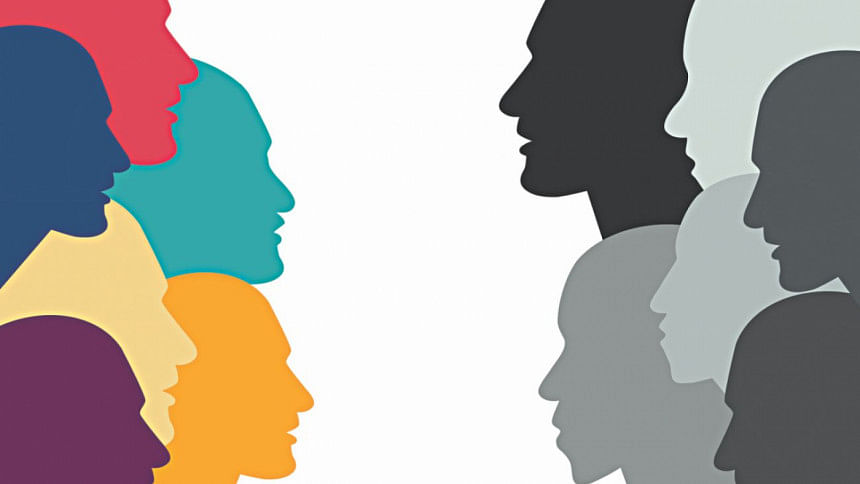The power of dialogue in a disrupted world

Closing the divides in our fractured world will require collaboration among many stakeholders. And, more often than not, it is dialogue that sets cooperation apart from conflict, and progress from painful reversals of fortune.
Good-faith dialogue—the ability to see the world through the eyes of other people, especially those with whom we disagree—has never been more important. We are living in an age when the Internet and other information and communications technologies have broken down traditional borders and brought us closer together. But it is also an age in which the drumbeat of nationalism is pushing us further apart. In the absence of calm, constructive, and sometimes uncomfortable conversations about what kind of future we want, intolerance and isolationism threaten to roll back centuries of progress.
The stakes really are that high. The World Economic Forum's 2018 Global Risks Report shows that an overwhelming majority of experts worldwide believe that a catastrophic conflict between major powers could erupt this year. In the meantime, problems within countries will continue to fuel public suspicion that the system is rigged to favour elites. Chief among those problems are rising inequality and declining social mobility. According to the International Monetary Fund, income inequality has increased in 53 percent of all countries over the past 30 years, and particularly in advanced economies.
The Greek Stoic philosopher Epictetus once said, "We have two ears and one mouth so that we can listen twice as much as we speak." The same principle applies to dialogue, which requires that we listen to different perspectives, and always keep an open mind. In 2018, that means heeding the public's grievances, and working together toward collective solutions. Only joint responses will suffice to tackle the complex problems we face.
The indispensability of multi-stakeholder dialogue to global progress is why it is the cornerstone of the Forum's guiding ethos. Beyond the vital work of organisations such as the United Nations, the Forum has created a space on the world stage where business leaders can rub shoulders with labour activists, and world leaders can talk—but, more important, listen.
Back in 1987, the WEF's annual meeting in Davos played a key role in preventing a war between Greece and Turkey. Turgut Őzal, Turkey's prime minister at the time, met with his Greek counterpart, Andreas Papandreou, and the two men formed a bond of trust that helped stave off a military conflict.
In Davos this year, a group of Israeli and Palestinian business leaders met to renew their commitment to a two-state solution, and pledged their support for strengthening the Palestinian economy.
Moreover, Greek Prime Minister Alexis Tsipras and the prime minister of the Former Yugoslav Republic of Macedonia (FYROM), Zoran Zaev, held the first prime-ministerial-level meeting between their two countries in seven years. Together, they advanced negotiations to end a lingering dispute that has stymied FYROM's bid for European Union accession. Last but not least, Davos hosted diplomatic talks to bolster ongoing multilateral peacemaking and political reconciliation efforts on the Korean Peninsula, in Venezuela, and in Sub-Saharan Africa and Somalia.
In 2018 and in the years ahead, longstanding geopolitical challenges will persist alongside fresh disruptions from the digital world. The Fourth Industrial Revolution and its attendant technologies—artificial intelligence (AI), bioengineering, and so forth—offer abundant opportunities for material and social progress. But they are also upending established business models and pushing modern warfare in frightening new directions.
The dilemmas confronting us today are profound. Should driverless vehicles value the lives of their passengers over those of pedestrians? Is there still such a thing as privacy in a world of facial recognition software and big-data applications? Should companies be able to patent human genes that they have isolated? Should AI make battlefield decisions?
None of these questions can be answered without thoughtful, open dialogue between segments of society that rarely interact. Technology companies, start-ups, international organisations, academics, and civil-society leaders need to come together with regulators and policymakers to develop measures that will limit the risks of new technologies without restricting innovation.
The Forum's San Francisco-based Center for the Fourth Industrial Revolution was founded in 2016 to facilitate this type of dialogue. And it has already brought together various stakeholders to formulate policy responses to the challenges posed by AI and machine learning, the Internet of Things, digital trade and cross-border data flows, civilian drones, and blockchain technology.
The world needs more of this kind of cooperative dialogue. Many people might hanker for a return to the supposedly simpler world of the past. But withdrawing into our cultures, nations, industries, and organisations is not the answer. In fact, it is part of the problem. For the sake of our shared future, we must recognise the power of dialogue.
Klaus Schwab, Founder and Executive Chairman of the World Economic Forum, is the author of The Fourth Industrial Revolution.
Copyright: Project Syndicate, 2018.
www.project-syndicate.org
(Exclusive to The Daily Star)





Comments